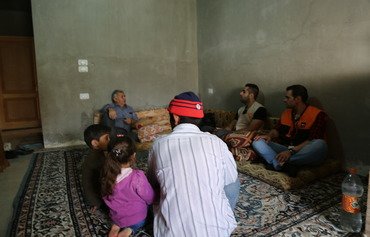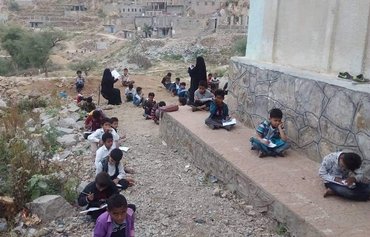Egypt has been tightening security measures in residential neighbourhoods in an effort to root out terror cells that hide out in rented apartments, officials tell Al-Mashareq.
Furnished apartments rented under short-term leases are coming under increasing scrutiny after it came to light that extremist elements have been using them as places to plan attacks and evade the law, they said.
The members of a number of terror cells have been arrested during raids on such apartments in various areas, which often involve clashes and confrontations with the security forces, security officials said.
"The past months saw several security operations that resulted in the arrest or killing of terrorists hiding or barricaded in furnished apartments they had rented under their names or names of others," said Lt. Col. Amin al-Zaini, of the Egyptian police, who is attached to Interpol.
Terrorists also have been found to use forged identity cards and pay enormous sums, often many times the amount of rent for the apartment, in exchange for the landlord not informing the police of their arrangement, he said.
"The rental process is mostly conducted with quick leases that are not documented with government departments and simply contain the signatures of the tenant and landlord, broker or real estate agent handling the property," he added.
This type of arrangement is increasingly common in areas such as 6th of October, downtown Cairo, al-Warraq, Dar es-Salaam, al-Basateen, al-Matariyah, Suez Bridge, Ain Shams and Helwan.
Full co-operation is needed
Al-Zaini stressed the need for the "full co-operation of citizens, brokers and real estate office owners with the security authorities in terms of reporting any suspect who might have rented an apartment".
A number of successful raids and arrests have been conducted based on reports provided by members of the public that were immediately followed up with investigations to verify their veracity, he said.
"The raids on apartments, which are taking place on an almost daily basis, are pre-emptive strikes directed at terrorist groups," al-Zaini said.
The recent arrests of Hasm Movement members as well as those involved in the St. Peter and St. Paul Coptic Orthodox Church bombing followed raids on the apartments they had leased, he said.
In a number of cases, he explained, extremists have used rental apartments to assemble improvised explosive devices (IEDs) and other explosive materials or as places to store weapons and explosives.
The raids on the furnished apartments have legal justification and are conducted with the approval of the public prosecutor, al-Zaini said.
"These operations are conducted with a high level of co-ordination between the various active Ministry of Interior departments, including the investigation, police, tourism police, and Interpol divisions, who co-ordinate the follow up on domestic and international wanted lists," he said.
Rental process largely unregulated
"The investigation of furnished apartment tenants is not new," said Mansoura University criminal law professor Ahmed Omar, adding that the instability of recent years has contributed to a decline in the oversight of the rental process.
Most leases are undocumented, he said, as they are not subject to the applicable rental law and the names on them are not subject to scrutiny by security authorities, as is the case with official government transactions.
Additionally, he said, there has been an increase in the number of unlicensed urban slum buildings which has expanded the populated areas.
The rental of furnished apartments in particular has been largely unregulated, he said, "which allowed terrorists to use them as safe havens and hideouts before and after carrying out terrorist attacks".
The disarray of the rental process prompted action by "security and intelligence forces, who took a comprehensive inventory of all furnished apartments in all provinces through field inspections and surveys of all districts", Omar said.
The personal data of tenants and all other occupants has been obtained and matched against the information provided by whoever handled the rental process, he added.
"Instructions were circulated to all apartment owners and those who work in the rental field to submit all required rental-related information to the police precinct in their area under the penalty of legal accountability," Omar said.
Increased rental property oversight
"The police department investigations division imposed a number of measures pertaining to the rental of furnished apartments," al-Maadi district real estate agency owner Ahmed Ismail told Al-Mashareq.
Each area is overseen by a police precinct, he said, which has an investigations division that follows up with agency owners, brokers, apartment owners and even doormen.
All entities are required to provide information to the investigations division on any new tenant, regardless of the length of the lease, he said.
The required information includes the tenant’s personal data, a copy of his identity card and a copy of the lease, he said, in addition to the personal data of all occupants and those who frequent the apartment on a regular basis.
Some apartment owners even prohibit or limit visitors, he added.
"The number of furnished apartments has been on the rise since the 1980s," Mahmoud al-Mohammad of the Ministry of Tourism’s Chamber of Tourism Companies told Al-Mashareq.
He attributed this to Egypt's need to accommodate local and foreign tourists.
The successive economic crises also have contributed to the increase in available accommodation, he said, "as furnished apartments have become a source of extra income for Egyptian families".
This real estate trend expanded with the erection of a large number of unlicensed buildings, he added, and has been spreading in all regions, including low income areas, after initially being confined to high end and tourist areas.
The security measures taken "are necessary to control this new situation and the terrorists' exploitation of these apartments", al-Mohammad said.
Regulating furnished apartments and putting them under scrutiny will yield positive results on the security and social fronts, he added.

![Egyptian authorities have been tightening security measures on rental apartments, focusing on densely populated residential areas in cities like Cairo. [Waleed Abu al-Khair/Al-Mashareq]](/cnmi_am/images/2017/02/03/7128-Egypt-Cairo-security-600_384.jpg)





